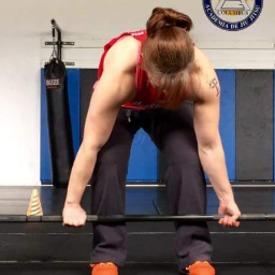Questions About Weight Loss Plateau's: Why do they happen, w
Replies
-
bump as I've hit a plateau0
-
Bump0
-
Great article. Have plateaued and feeling hungry all the time. I plan to start over and go back onto protein rich diet shakes and do some weights based exercises such as Bodypump. Will let you know how I get on.0
-
I gave myself 2 weeks of not worrying and ate upto 1900 cals as calculated on another website ( recommended butcan't quite remember) I started my usual routine again but contined eating 1900 cals and hey presto am losing weight again! Looking forward to getting to my final target! Thanks for the advice0
-
need this lol0
-
Bump!
I've hit a plateau because of my poor eating and need to get back on track. Great post!0 -
thanks all glad to help
 0
0 -
bump0
-
/bump0
-
Thank you for the post. I tried everything but calorie cycling. I'll start it tomorrow and see if it works for me.0
-
Thanks for the information
 0
0 -
Bump * All my mfp friends please read!

Great post thanks!0 -
Great Post!0
-
welcome !!0
-
Thank you!!!!0
-
bump0
-
welcome =D0
-
Another write up I did on my weight loss page I thought could be helpful to our MFP community

First things first........
Are we to blame?
Some dieters are anxious to blame their plateau on physiological changes, rather than looking first to see if we are causing the plateau. Ask yourself these questions:
* Have you been watching your calories?
* Have you been exercising at a high intensity?
* Have you been exercising regularly? 4-6 days a week, 30-90mins a day?
If you’re not sure that you can answer these questions in the affirmative, you might want to rethink your current actions before you start blaming the plateau on other things.
You can start keeping a food journal and writing down your exercise minutes to see if you could work a little harder. Maybe you’ve been eating more fatty foods and you just haven’t realized it. Or maybe it’s time that you try to workout out at a faster pace than you have been.
A weight loss plateau is going to happen at one point or another, but instead of sitting still and suffering through it; you know what to do to overcome it and continue on the path to your weight loss goals.
Nothing is more frustrating to us then not losing weight when you expect too. Just when we've started to get the hang of a new lifestyle our body stops responding to the hard work that we are doing. This is generally referred to as a plateau in weight loss; here are some of the classic signs and what we can do.
* The scale isn’t moving
* Clothes aren’t getting bigger
* You’re hungry all the time
* Exercises aren’t as difficult
* You’re doing the same things, but not getting any results
What’s most frustrating about these signs is the fact that it might seem like we are doing everything right. You’re eating what we’re supposed to be eating, working out when we plan to, and even cutting back further than we have to on your chosen diet plan. Question is what’s going on?
What causes a weight loss plateau?
We can generally blame Mother Nature for our metabolic frustrations. What happens is that as our body changes, it starts to get ‘used’ to the new weight and wants to settle there. Our body has given us as many results as possible using the current menu and fitness program we’re on.
The reason why our body does this is to avoid starvation. It senses that it’s not getting as much food as it used to and so it tries to hold onto what we’re giving it. Or it’s getting used to the exercises that we’re doing, so it’s not responding in the same way. Basically, our body is leveling out.
What can we do?
But now that we know what a plateau is and what the signs of it can be, we can start to tailor our weight loss routine to prevent or stop a plateau. What we need to do is change up what we’ve already been doing so that our body has to respond. This can include several things:
* Increase our calorie intake slightly - Zig-Zag, or calorie cycling is the process of varying daily calorie intake, while maintaining the same weekly intake. Instead of consuming (for example) precisely 1800 calories each day - you can mix it up. Eat 1500 calories one day, and 2100 calories the next. This can be as simple as halving then doubling a portion size, or adding a post-workout shake into the plan. Just keep your body guessing.
* Increase the intensity of our exercise plan - make your body work hard, Are you doing the treadmill for an hour every day? Give it up and enroll in a kickboxing class instead. Doing the stationary bike? Switch to the Stair-master. Or try playing with the intensity of the workout. Add one minute intervals at a high speed or incline (not both) followed by three or four minutes at a lower intensity. If you've been working alone, it may be a good idea to enlist the help of a workout buddy or even pay for a few sessions with a personal trainer. Whenever you change a workout routine your body will respond by dropping fat/weight.
* Try adding more protein to our diet - not fatty ones lean & healthy meats & nuts, Although it sounds complicated, once again, the idea is to change what you are eating. If (for example) you are eating a moderate diet that is higher in carbs - try eating less carbs and more protein. There is no need to get super-technical over the whole thing. If you have a carbohydrate snack every day at morning tea time - change it to a protein snack. Whatever you are doing consistently - try mixing it up a bit.
* Drink more water - already drink 8 glasses, drink more! - Thirst is often mistaken for hunger. Every time you feel the urge to snack, drink a glass of water first and see if the urge goes away. Decaf teas, calorie-free drinks, and seltzer water count towards your eight glasses of water a day, but add an extra glass for each cup of coffee you drink, as caffeine dehydrates.
* Break Up Your Meals - If you are eating three square meals a day - start adding snacks in between (which may mean reducing the portion size of the main meals). Eating often is an old and common style of eating - once again, you are trying to boost your metabolic rate.
* Rely on a Friend - If you're having a hard time finding the motivation to step up your program, find a like-minded buddy, either real or virtual. Join a support group, find an appropriate chat room, or sign up with a motivational website.
* Watch Your Carbs - You don't have to go on a low carb diet (in fact, low-carb and exercise don’t mix well), but do watch out for the extra refined carbohydrates that tend to slip into everybody's diet. Be mindful not only of white flour and sugars, but also look for hidden carbs in foods such as ketchup, salad dressings, dairy products, and even soups. Read labels –Many low-fat products, including fruit juices and energy bars, are high in sugars. Avoid carbs at dinnertime, and opt for a larger salad as a side dish. When you do eat carbs, stick to whole grains. Plateaus are sometimes due to water retention. Restricting salt intake and reducing carbs can give you the jumpstart and the motivation to keep going.
* Pump It Up - A common mistake women make is skipping weights because of the fear they would look "bulky." Truth is, us women lack the testosterone needed to develop large muscles. Done appropriately, weight training can break a plateau faster than any other method. The body's basal metabolic rate increases with increases in muscle mass, which promotes long-term fat loss and helps dieters avoid yo-yo dieting. Moreover, intense workouts elevate the metabolism for several hours following the workout, which also promotes fat loss. If you've never tried weights before, start slow and light, mixing machines and free weights. Weights should be done three times a week, alternating muscle groups.
* Cut down your alcohol intake - Alcohol is, in fact, very dense in calories. 7kcal/gram compared to only 4 for proteins and carbs, and that's without taking into consideration that many alcoholic drinks (such as cocktails) are high in sugars and fat. Alcohol consumption slows down the fat burning capabilities of the body, as the body focuses on using the alcohol (a toxin) as fuel, rather than burning fat for energy. Alcohol also dehydrates, which, in turn, can make you hungry.
These simple steps can sometimes recharge our body and put it back into fat-burning, weight-losing mode. A weight loss plateau is something that every dieter will see at one point or another, so don’t feel like we’re not heading in the right direction. Often, a plateau is that sign that we are doing a great job already, but that we need to tweak something.
I hope this helps
Bump. Thank you 0
0 -
Bump. This is awesome!0
-
Hey great post!0
-
that was nice...thank0
-
I'm struggling thru a plateau! Lost a bunch of weight (75 lbs) about 10 yrs. ago.... but about 15 lbs of that has creeped back on and I'm 10 yrs older! HOW DID EITHER OF THOSE HAPPEN!?!? :noway:
But I feel so good when I work out that I just keep doing in hopes that the scale will WAKE UP AND START GOING DOWN! :devil:0 -
Very helpful thanks so much for posting!0
-
/bump0
-
/bump0
-
Thanks , very helpfull. Really great tips!0
-
This is a great post and came at just the right time! Thank you!0
-
np, your welcome
 0
0 -
Bump0
-
thank you
 0
0
This discussion has been closed.
Categories
- All Categories
- 1.4M Health, Wellness and Goals
- 398.1K Introduce Yourself
- 44.7K Getting Started
- 261K Health and Weight Loss
- 176.4K Food and Nutrition
- 47.7K Recipes
- 233K Fitness and Exercise
- 462 Sleep, Mindfulness and Overall Wellness
- 6.5K Goal: Maintaining Weight
- 8.7K Goal: Gaining Weight and Body Building
- 153.5K Motivation and Support
- 8.4K Challenges
- 1.4K Debate Club
- 96.5K Chit-Chat
- 2.6K Fun and Games
- 4.8K MyFitnessPal Information
- 12 News and Announcements
- 21 MyFitnessPal Academy
- 1.5K Feature Suggestions and Ideas
- 3.2K MyFitnessPal Tech Support Questions




















